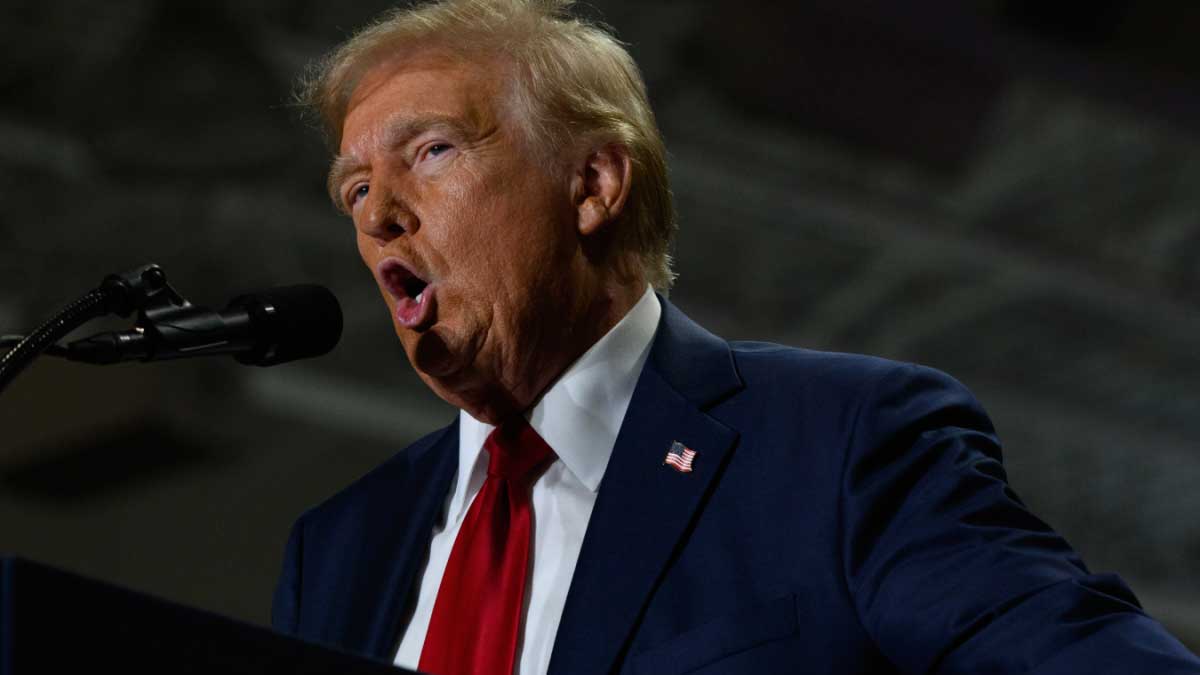- Home
- Billionaires
- Investing Newsletters
- 193CC 1000
- Article Layout 2
- Article Layout 3
- Article Layout 4
- Article Layout 5
- Article Layout 6
- Article Layout 7
- Article Layout 8
- Article Layout 9
- Article Layout 10
- Article Layout 11
- Article Layout 12
- Article Layout 13
- Article Layout 14
- Article Sidebar
- Post Format
- pages
- Archive Layouts
- Post Gallery
- Post Video Background
- Post Review
- Sponsored Post
- Leadership
- Business
- Money
- Small Business
- Innovation
- Shop
Recent Posts
Trump and Allies Gear Up for Election Challenges in 2024

In the lead-up to the 2024 election, former President Donald Trump has made it clear he is preparing to challenge the legitimacy of the results should he lose to Vice President Kamala Harris. By casting doubt on the integrity of the electoral process, Trump has set the stage for potential disputes surrounding the election. His allies have already begun laying the groundwork through a series of lawsuits targeting key aspects of the electoral system in several critical swing states.
A primary focus of Trump’s narrative centers around immigration and voting. He has repeatedly and unfoundedly asserted that undocumented migrants cast ballots in U.S. elections. In line with this claim, his supporters have filed multiple lawsuits. For example, groups aligned with Trump, such as America First Legal, have initiated legal challenges in Arizona and Nevada, alleging that these states lack adequate protections against non-citizen voting. These suits specifically question the voter registration process, arguing that states must require proof of citizenship for all registered voters, despite differing requirements for federal and state elections.
In total, nearly 90 lawsuits have been filed by Republican entities nationwide, aiming to create a framework for disputing election outcomes. The New York Times has reported that these cases include a significant suit from the Republican National Committee in Montgomery County, Pennsylvania. This lawsuit contends that election officials failed to meet the deadline for conducting logic and accuracy testing on the state’s voting machines, which could cast doubt on the reliability of the electoral process in a state that plays a crucial role in national elections.
The issue of mail-in ballots has also become a battleground in these legal disputes. In Michigan, the Republican National Committee has challenged the validity of absentee ballots, arguing they should be rejected if they are mailed without a signed statement from election officials verifying the voter’s signature on the absentee ballot request. Similarly, in North Carolina, the GOP is pushing for absentee ballots to be discarded if they are not sent in a “container-return” sealed envelope. These efforts illustrate a broader strategy aimed at questioning the validity of mail-in voting, which has become increasingly common.
Moreover, allegations surrounding the harassment of election officials have emerged as another contentious topic. The America First Policy Institute, along with the Arizona Free Enterprise Club, is currently engaged in litigation aimed at preventing the implementation of a law designed to protect election officials and voters from harassment. They argue that the law is vague and infringes on their First Amendment rights. As it stands, the law remains blocked while the case moves through the judicial system, highlighting the contentious relationship between election officials and certain political groups.
Trump and his supporters have also leveled claims that Vice President Harris’s late entry into the presidential race constitutes a “coup” and is unconstitutional. This argument stems from the assertion that she announced her candidacy after Biden had secured the Democratic nomination. Legal experts argue this claim lacks merit, as Harris was formally nominated by Biden’s delegates, yet it raises suspicions that could undermine public confidence in the electoral process.
In a related vein, Trump has accused the Harris campaign of “illegally spying” on him following charges by the Justice Department against three Iranian hackers. These individuals were accused of stealing information from Trump’s campaign and transmitting it to the Biden campaign. However, the FBI has stated there is no evidence supporting claims of coordination between the Biden-Harris campaign and these hackers.
On the flip side, Democrats and allied organizations have also initiated lawsuits aimed at challenging voting laws in Republican-led states. They argue these laws are overly restrictive, potentially hindering voter access, and unnecessarily complicate the electoral process. For instance, last month, the Georgia Democratic Party filed a lawsuit against the state, contending that new rules from the Georgia State Election Board would enable county election officials to unjustly reject election results. The new regulations require officials to conduct a “reasonable inquiry” into potential fraud and misconduct, but Democrats argue that such authority lies solely within the courts, not county officials.
Despite his combative stance, Trump has previously stated he would accept the results of the election if it is conducted fairly. During a June CNN debate, he remarked that he would abide by the results of a “fair and legal” election. Nevertheless, he has consistently expressed his belief that Democrats can only win through cheating, undermining the credibility of the electoral process in the eyes of his supporters. Recently, in an interview on the radio program “Full Measure,” Trump declared that he would not seek the presidency again in 2028 if he were to lose in 2024.
Looking ahead, it is evident that some Republicans in Congress have echoed Trump’s position, stating they will only accept election results deemed fair and without any evidence of fraud. Congress traditionally plays a ceremonial role in certifying the results of the Electoral College, but this process was disrupted after the 2020 election when Trump’s supporters stormed the Capitol to challenge the results. House Speaker Mike Johnson, a prominent figure in the GOP, reaffirmed this stance, stating that they would respect the Constitution in the event of a free, fair, and safe election.
The backdrop to these ongoing legal and political maneuvers is Trump’s previous unsuccessful attempts to contest the 2020 election results. Out of 64 lawsuits filed by Trump and his allies across battleground states, only one, in Pennsylvania, was successful, according to a report titled “Lost, Not Stolen” by a group of conservative legal experts. The majority of these cases, which included allegations of various forms of electoral misconduct, were dismissed by judges from both parties, including those appointed by Trump himself.
As the 2024 election approaches, the landscape remains fraught with uncertainty, fueled by a combination of legal challenges, rhetoric from key political figures, and a public still grappling with the aftermath of the previous election.
Recent Posts
Categories
- 193cc Digital Assets2
- 5G1
- Aerospace & Defense48
- AI37
- Arts3
- Banking & Insurance11
- Big Data3
- Billionaires819
- Boats & Planes1
- Business332
- Careers13
- Cars & Bikes79
- CEO Network1
- CFO Network17
- CHRO Network1
- CIO Network1
- Cloud10
- CMO Network18
- Commercial Real Estate7
- Consultant1
- Consumer Tech194
- CxO1
- Cybersecurity73
- Dining1
- Diversity, Equity & Inclusion4
- Education7
- Energy8
- Enterprise Tech29
- Events11
- Fintech1
- Food & Drink2
- Franchises1
- Freelance1
- Future Of Work2
- Games149
- GIG1
- Healthcare79
- Hollywood & Entertainment203
- Houses1
- Innovation46
- Investing2
- Investing Newsletters4
- Leadership65
- Lifestyle11
- Manufacturing1
- Markets20
- Media195
- Mobile phone1
- Money13
- Personal Finance2
- Policy569
- Real Estate1
- Research6
- Retail1
- Retirement1
- Small Business1
- SportsMoney42
- Style & Beauty1
- Success Income1
- Taxes2
- Travel10
- Uncategorized12
- Vices1
- Watches & Jewelry2
- world's billionaires788
Related Articles
South Korea Plane Crash: A Tragic Loss and Global Mourning
The tragic plane crash at South Korea’s Muan International Airport on Sunday...
By 193cc Agency CouncilDecember 30, 2024H-1B Visa Debate Splits Trump Allies and Silicon Valley
The debate over H-1B visas has once again become a contentious issue,...
By 193cc Agency CouncilDecember 28, 2024Trump Moves $4B Stake in Truth Social Parent, Stock Drops 6%
Donald Trump recently transferred his 57% stake in Trump Media & Technology...
By 193cc Agency CouncilDecember 20, 2024House Rejects Trump-Backed Funding Bill, Shutdown Looms
The U.S. House of Representatives rejected a new government funding bill on...
By 193cc Agency CouncilDecember 20, 2024















Leave a comment